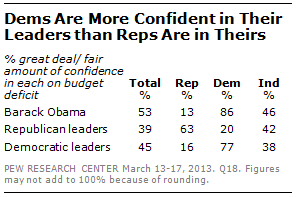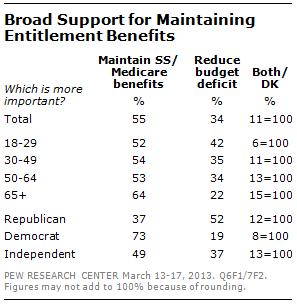Since December, Obama’s job approval has declined among Democrats and independents. His job approval among Republicans, already low in December (12% approve), remains about that low today (14%).
 About three-quarters of Democrats (76%) approve of Obama’s job performance, down 12 points since December. His job approval has declined 13 points among conservative and moderate Democrats (from 83% to 70%) and eight points among liberal Democrats (from 95% to 87%).
About three-quarters of Democrats (76%) approve of Obama’s job performance, down 12 points since December. His job approval has declined 13 points among conservative and moderate Democrats (from 83% to 70%) and eight points among liberal Democrats (from 95% to 87%).
Just 42% of independents approve of the way Obama is handling his job as president. In December, 53% approved of his job performance. The shift since then has come largely among Democratic-leaning independents: 71% approve today, down from 82% in December. There has been less change among Republican-leaning independents; just 15% currently say they approve of Obama’s job performance.
Confidence in Obama, Congressional Leaders on Budget Deficit
Despite his lower approval rating, Obama continues to engender more confidence on the federal budget deficit than  either GOP leaders in Congress or Democratic congressional leaders.
either GOP leaders in Congress or Democratic congressional leaders.
A majority (53%) says they have a great deal (22%) or a fair amount (31%) of confidence in Obama when it comes to dealing with the federal budget deficit. By contrast, 39% have at least a fair amount of confidence in congressional Republican leaders on the deficit and just 8% have a great deal of confidence. Democratic congressional leaders fair only slightly better: 45% have at least a fair amount of confidence in Democratic leaders; 11% have a great deal of confidence.
These views have changed little since September 2011, shortly after the contentious negotiations over raising the nation’s debt ceiling. At that time, 52% had a great deal or a fair amount of confidence in Obama on the deficit, 35% expressed that degree of confidence in GOP leaders and 43% had confidence in Democratic leaders.
 Democrats express more confidence in Obama and Democratic leaders to deal with the budget deficit than Republicans express in GOP leaders. Fully 86% of Democrats have at least a fair amount of confidence in Obama, while 77% have that level of confidence in Democratic leaders. By contrast, 63% of Republicans have a great deal or a fair amount of confidence in GOP leaders to deal with the deficit.
Democrats express more confidence in Obama and Democratic leaders to deal with the budget deficit than Republicans express in GOP leaders. Fully 86% of Democrats have at least a fair amount of confidence in Obama, while 77% have that level of confidence in Democratic leaders. By contrast, 63% of Republicans have a great deal or a fair amount of confidence in GOP leaders to deal with the deficit.
Independents are divided when it comes to confidence in Obama’s handling of the deficit: 46% say they have at least a fair amount of confidence, while 52% have little or no confidence. About four-in-ten independents (42%) say they have at least a fair amount of confidence in GOP congressional leaders while 55% have little or no confidence.
Public Still Unwilling to Cut Entitlement Benefits to Reduce Deficit
 As Washington debates competing deficit reduction plans, the public continues to say it is more important to keep Social Security and Medicare benefits as they are than to take steps to reduce the budget deficit. There has been little change in these opinions over the past two years.
As Washington debates competing deficit reduction plans, the public continues to say it is more important to keep Social Security and Medicare benefits as they are than to take steps to reduce the budget deficit. There has been little change in these opinions over the past two years.
Majorities across all age groups say it is more important to maintain Social Security and Medicare benefits as they are than it is to take steps to reduce the budget deficit.  Nonetheless, those 65 and older are more likely than younger people to express this view.
Nonetheless, those 65 and older are more likely than younger people to express this view.
By about four-to-one (73% to 19%), Democrats prioritize keeping Social Security and Medicare benefits as they are over taking steps to reduce the deficit. Independents, by 49% to 37%, also say it is more important to keep Social Security and Medicare benefits are they are. By contrast, Republicans give higher priority to deficit reduction: 52% say it is more important to take steps to cut the deficit, while 37% say it is more important to keep Social Security and Medicare benefits as they are.


